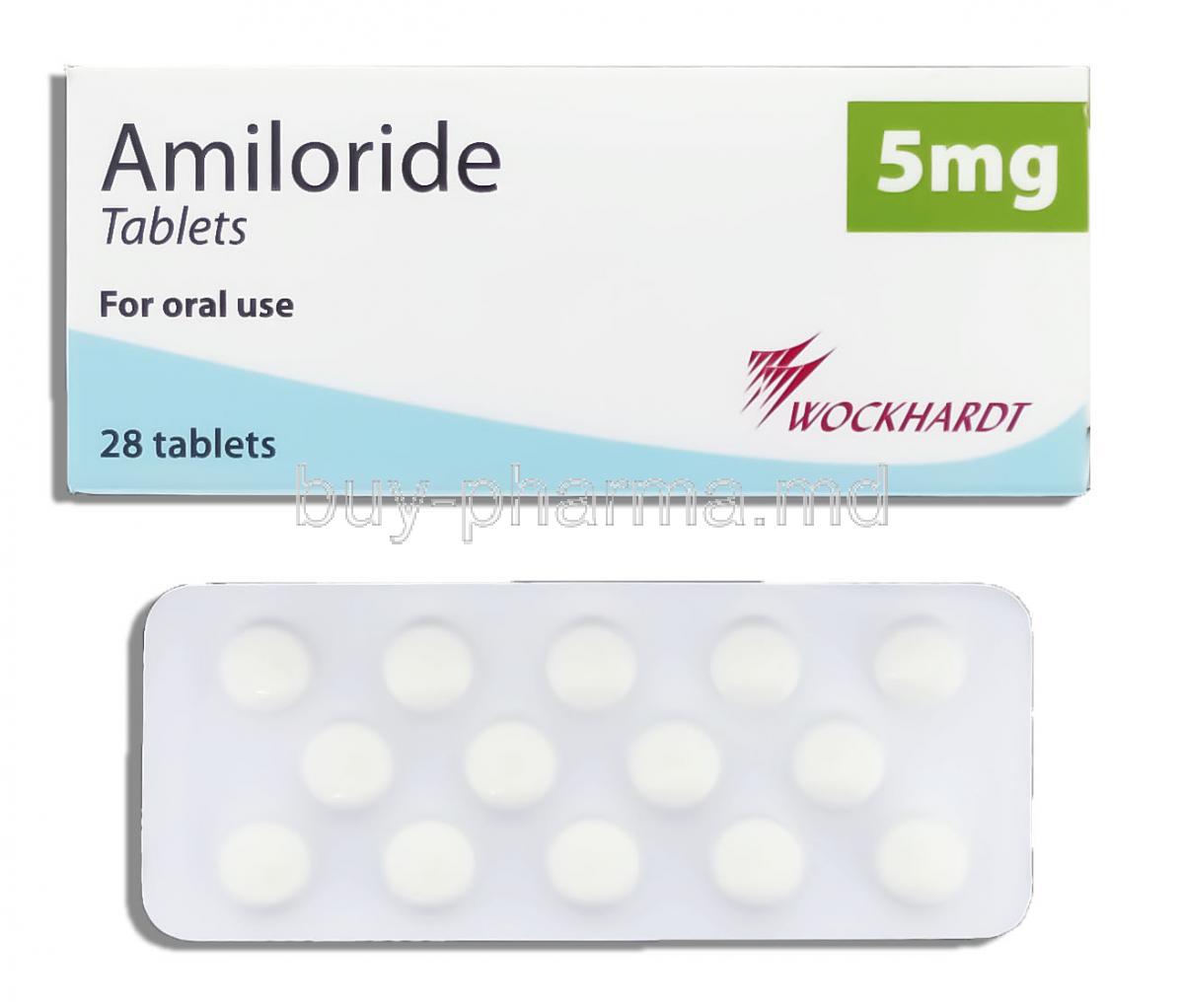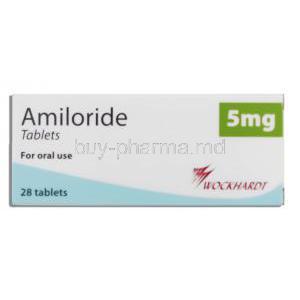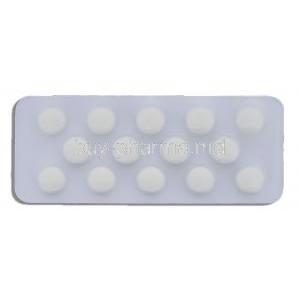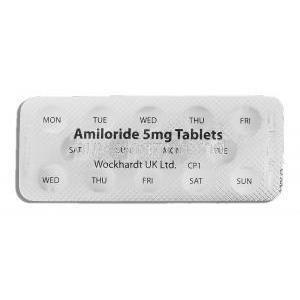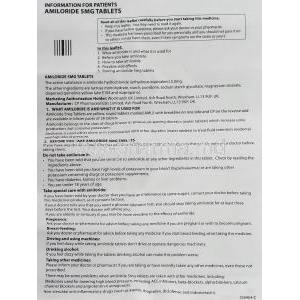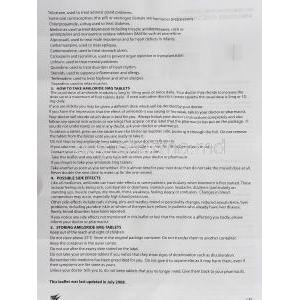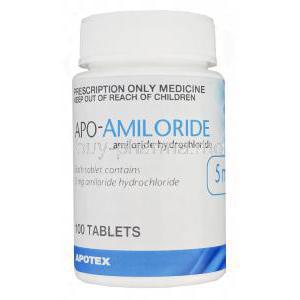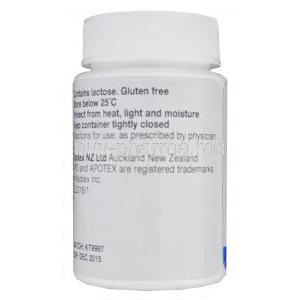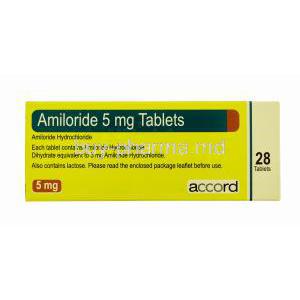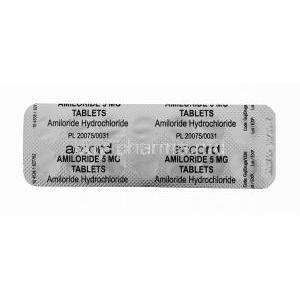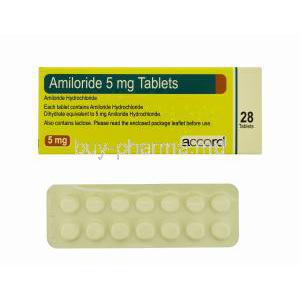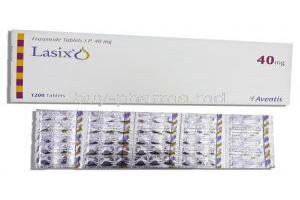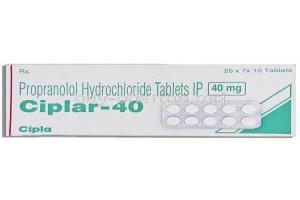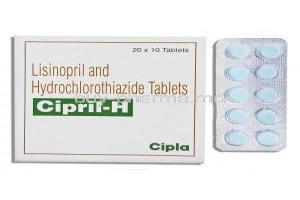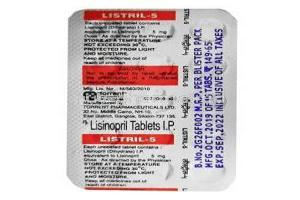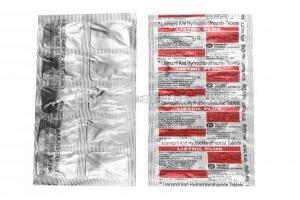Amiloride
- Introduction
- Uses of Amiloride
- How Amiloride Works
- Off-label Uses
- Dosage and Administration
- Composition
- Common Side Effects
- Severe Side Effects and Warning
- Contraindications
- Interactions
- Careful Administration and Important Precautions
- Administration to Specific Populations
- Overdosage
- Storage Instructions
- Handling Precautions
Introduction
Background and discovery of Amiloride
Amiloride, a drug used to increase urine production, was initially introduced to the medical field during the second half of the 20th century. Its introduction represented a breakthrough in kidney medication as it offered a distinct way of functioning compared to other diuretics. Developed through research and testing, Amiloride emerged as a leading treatment option for specific kidney disorders.
General properties and characteristics
Amiloride is known for its yellowish color and its ability to selectively block sodium channels, which makes it different from other diuretic drugs. In a setting, this compound is highly regarded for its advantages, including; High bioavailability, Quick onset of action, Relatively long duration of effect, Minimal changes in metabolism
Uses of Amiloride
Primary indications for prescription
Amiloride is a diuretic medication that has become increasingly important in the treatment of hypertension and congestive heart failure 1. Its unique characteristics have been found to be essential in controlling retention and elevated blood pressure, thereby alleviating stress on the cardiovascular system 1.
Here are some references that provide more information on Amiloride:
- Medscape: This website provides detailed information on Amiloride, including its dosing, indications, interactions, adverse effects, and more.
- SpringerLink: This article discusses how Amiloride improves hemodynamics in patients with chronic congestive heart failure.
- Mayo Clinic: This website provides information on the side effects of Amiloride and its use in treating water retention (edema) in patients with congestive heart failure.
- BMJ Best Practice: This website provides an overview of heart failure with reduced ejection fraction and its treatment options.
- SAGE Journals: This article provides a review of Amiloride’s use in oedematous states and for potassium conservation adjunctive to thiazide or loop diuretics for hypertension, congestive heart failure, and hepatic cirrhosis with ascites.
Benefits in treating specific conditions
Amiloride has a range of uses, such as preventing the loss of potassium caused by other diuretics, reducing swelling in patients with congestive heart failure, and helping to manage hypertension alongside other blood pressure medications.
Mechanism of action
Amiloride works by blocking the reabsorption of sodium in the renal tubules. This action inhibits the uptake of sodium, resulting in increased excretion of both sodium and water while also preserving potassium ions.
How Amiloride Works
The cellular level of action
At this level, Amiloride acts explicitly on the epithelial sodium channels (ENaCs) located on the outer surface of the kidney collecting tubule. By blocking these channels, Amiloride hinders the entry of sodium ions into the cells, reducing their absorption and increasing their elimination.
Impact on kidney function and electrolyte balance
The primary role of the kidneys is to regulate electrolyte balance. Amiloride works on the tubules to make sure that potassium is preserved, preventing a condition called hypokalemia, which is often seen with other diuretics. At the time, it helps get rid of sodium and water, which helps reduce volume and manage blood pressure.
Off-label Uses
Unconventional uses and emerging research
Amiloride is a diuretic medication that has been found to have alternative uses in treating cystic fibrosis and certain neurological disorders 1. Recent studies have discovered that Amiloride is effective in treating cystic fibrosis by improving the clearance of mucus 2. It has also been found to have potential benefits in certain neurological disorders because of its ability to protect the nervous system 3.
Here are some references that provide more information on Amiloride:
- Medscape: This website provides detailed information on Amiloride, including its dosing, indications, interactions, adverse effects, and more.
- SpringerLink: This article discusses how Amiloride improves hemodynamics in patients with chronic congestive heart failure.
- Mayo Clinic: This website provides information on the side effects of Amiloride and its use in treating water retention (edema) in patients with congestive heart failure.
- BMJ Best Practice: This website provides an overview of heart failure with reduced ejection fraction and its treatment options.
- [SAGE Journals]: This article provides a review of Amiloride’s use in oedematous states and for potassium conservation adjunctive to thiazide or loop diuretics for hypertension, congestive heart failure, and hepatic cirrhosis with ascites.
Efficacy and safety in off-label conditions
Like all medications, the use of Amiloride in situations not explicitly approved by agencies requires thorough evaluation. Initial findings show encouraging results. It is crucial to conduct comprehensive clinical trials to establish its safety and effectiveness in these specific circumstances.
Dosage and Administration
Standard dosing guidelines
Usually, doctors start patients on doses of Amiloride and adjust the dosage based on how they respond to the medication and their lab results. It's crucial to check electrolyte levels in the blood, especially potassium.
Adjustments based on age, condition, and other factors
Physicians need to assess certain factors, like renal function, patient age, and concurrent medications, before starting or modifying the dosage of the drug. Adjustments may be required based on these parameters.
Route of administration
Amiloride is typically given by mouth in the form of tablets. It is crucial to take it whether with or, without food, to maintain steady therapeutic levels.
Composition
Active ingredients and their concentrations
Amiloride tablets contain Amiloride hydrochloride as the component in concentrations typically ranging from 5 to 10 mg per tablet. It is this ingredient that produces the desired therapeutic effects of the medication.

Inactive components and their roles
Like other medications, Amiloride tablets contain various additional substances and inactive ingredients. These can consist of binders, fillers, and stabilizers that give the tablet characteristics like stability, shape, and shelf life.
Common Side Effects
Mild symptoms associated with Amiloride use
Patients taking Amiloride may encounter side effects such as nausea, headaches, dizziness, and stomach discomfort. However, these symptoms typically diminish with usage or minor adjustments to the dosage.
Duration and management of these effects
Most of these side effects are usually temporary. Go away on their own. If they continue, it's an idea to seek advice from a healthcare professional. Adjusting the dosage or receiving support treatments may be suggested.
Severe Side Effects and Warning
Rare but critical side effects to be aware of
Though uncommon, a few patients may experience side effects, like elevated blood potassium levels (known as hyperkalemia), shortness of breath, chest pain, and irregular heartbeats. If you notice any of these symptoms, it is crucial to seek medical attention.
Immediate actions to take upon their appearance
If you experience any side effects, it is essential to stop taking Amiloride immediately and seek immediate medical attention. Monitoring and laboratory tests are crucial in detecting and addressing these concerns early on.
Contraindications
Situations and conditions where Amiloride should not be used
Amiloride should not be used in patients with anuria (lack of urine production), kidney problems, high levels of potassium in their blood (hyperkalemia), or a known allergy to the medication.
Potential risk factors and exclusions
Taking potassium supplements or potassium-sparing diuretics with Amiloride can increase the chances of experiencing hyperkalemia. It's also essential for patients with kidney problems or those using ACE inhibitors to be cautious when considering the use of Amiloride. Remember to seek advice from a healthcare professional before making any decisions regarding medications or treatment.
Interactions
Drugs that may interfere with Amiloride’s efficacy
Like medications, Amiloride has the potential to interact with other drugs, which can affect its effectiveness and safety. Some interactions can have effects, while others may reduce the effectiveness of Amiloride. It's essential to be aware of interactions: 1. Angiotensin-converting enzyme (ACE) inhibitors: Using them with Amiloride may increase the risk of potassium levels. 2. Potassium supplements: Taking them alongside Amiloride can dangerously raise potassium levels. 3. Non-steroidal anti-inflammatory drugs (NSAIDs); They might weaken the effect of Amiloride. 4. Other diuretics: When used together, they can enhance the antihypertensive effects. It is crucial to discuss any medications or supplements you are taking with your healthcare provider to ensure their compatibility with Amiloride.
Foods or supplements to avoid
It is recommended to be cautious with the consumption of foods in potassium and to avoid potassium supplements while taking Amiloride unless specifically instructed by a healthcare professional. Consuming amounts of potassium along with Amiloride can result in a severe condition called hyperkalemia, which can be life-threatening. Some foods that you should keep an eye on include oranges and orange juice, bananas, spinach, potatoes, and tomatoes.
Careful Administration and Important Precautions
Specific patient populations that require monitoring
Some specific groups of people require monitoring when they are prescribed Amiloride. These include individuals with 1. Dysfunction: There is an increased risk of high potassium levels, and the drug may not be excreted efficiently. 2. Diabetes: Blood sugar levels may vary unpredictably in these individuals. 3. Liver disease: Changes in metabolism can impact how Amiloride is processed in the body.
Potential adverse reactions to be vigilant for
Although Amiloride is usually well tolerated, healthcare professionals should stay vigilant for side effects, particularly hyperkalemia, hyponatremia, and renal dysfunction. Regular monitoring through laboratory tests can help. Address these abnormalities at an early stage.
Administration to Specific Populations
Elderly: Dose adjustments and risks
Due to the changes associated with aging, older people may experience a different reaction to Amiloride. It is essential to adjust and monitor the dosage in individuals with compromised kidney function, which is often the case in this population. Furthermore, elderly individuals may be more prone to experiencing side effects from medication, including imbalances in electrolytes.
Pregnant Women and Nursing Mothers: Safety profile and recommendations
Amiloride should only be given to women if the benefits outweigh the potential risks to the unborn baby. It is crucial to consider the positive effects of the treatment compared to any possible impact on the baby during pregnancy. Breastfeeding mothers should be cautious as it is not clear whether Amiloride passes into breast milk and how it may impact the newborn.
Children: Pediatric dosing and precautions
The safety and effectiveness of Amiloride in children has not been definitively established. Therefore, it is essential to use it in the population under careful clinical supervision. The dosage should be adjusted according to the child's weight, age, and kidney function. Regular monitoring is essential to ensure both the safety and effectiveness of the medication.
Overdosage
Recognizing symptoms of Amiloride overdose
Taking an amount of Amiloride can result in a significant increase, in potassium levels, which may manifest as various symptoms including; Irregular heart rhythms, Muscle spasms Fatigue Numbness
Immediate steps and treatments
If someone is suspected of taking too much medication, it's essential to seek immediate medical help. The main focus of treatment involves providing care, closely monitoring the patient, and taking steps to lower their potassium levels. This may include using calcium, administering glucose through an infusion, or using sodium bicarbonate if needed.
Storage Instructions
Recommended temperature and conditions
Amiloride should be stored in a room with a temperature away from excessive heat and moisture. It is crucial to create a controlled environment to ensure that its pharmacological properties remain intact.
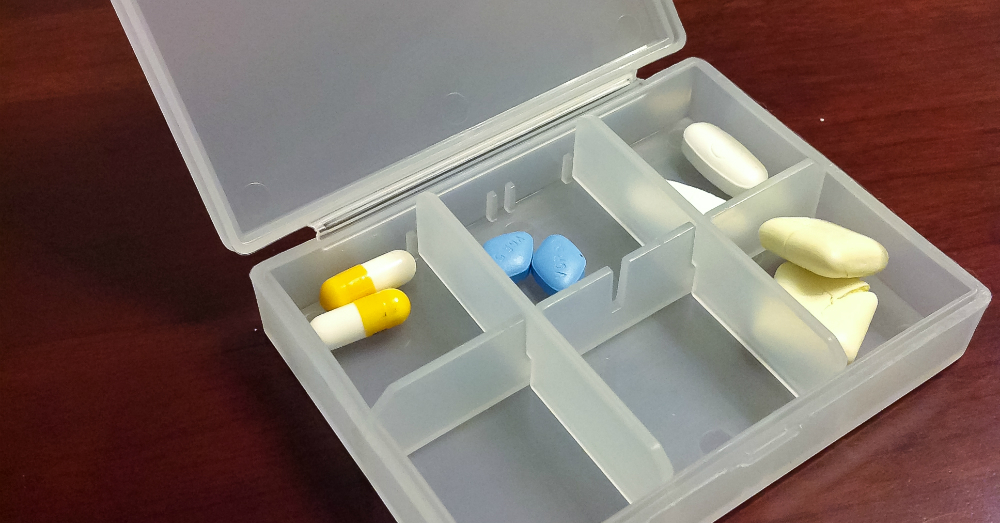
Shelf life and expiration concerns
Like any medication, Amiloride has a specific expiration date, after which its effectiveness may be compromised. It is essential to avoid using expired medicines as they can have effects. Therefore, it is crucial to check the viability of the drug to ensure its effectiveness.
Handling Precautions
Safe handling and disposal of Amiloride
To avoid contact or consumption, it is essential to store Amiloride in an inaccessible location for children and pets. If you have expired medication, dispose of it responsibly by returning it to a pharmacy or participating in community drug take-back programs.
Measures to prevent accidental ingestion or exposure
To prevent consumption, it is essential to store Amiloride in its original container and clearly label it. Furthermore, caregivers should receive education about the possible risks associated with the medication to ensure they stay attentive and well-informed.

